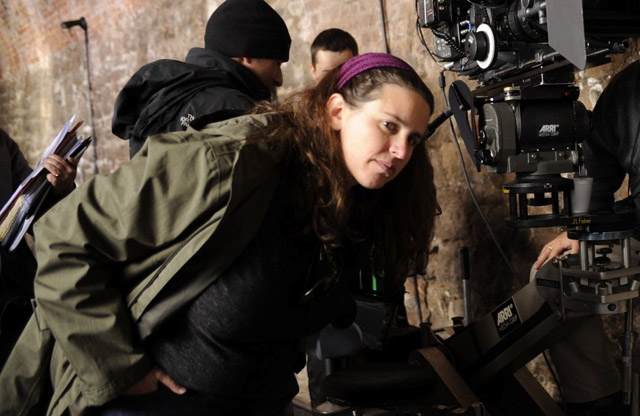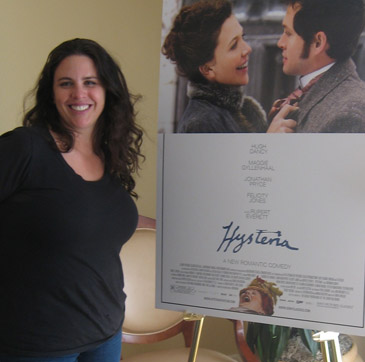CHICAGO – Excelsior! Comic book legend Stan Lee’s famous exclamation puts a fine point on the third and final play of Mark Pracht’s FOUR COLOR TRILOGY, “The House of Ideas,” presented by and staged at City Lit Theater in Chicago’s Edgewater neighborhood. For tickets/details, click HOUSE OF IDEAS.
Interview: Director Tanya Wexler Has the Buzz on ‘Hysteria’
CHICAGO – When creating a film about the origins of the vibrator, it’s best not to take yourself too seriously. The brassy, bubbly director Tanya Wexler helped convert a two page premise into a sly romantic comedy. The cast of Maggie Gyllehaal, Hugh Dancy, Jonathan Pryce, and Felicity Jones take the journey with her.
“Hysteria” refers to medical condition, a catch-all term to describe a woman’s ennui during the latter half of the 19th century in Victorian England. One medical doctor, portrayed by Jonathan Pryce, has discovered that female private part “stimulation” is the key to curing what ails them, and takes on a younger doctor (Hugh Dancy) as a co-applicator of the treatment. After losing the feeling in his hand, the younger physician decides to electrify the treatment, and the vibrator is born.
 Photo credit: Liam Daniels for Sony Pictures Classics |
Given the subject matter, the essence of the story is played out as an absurdity, with multiple innuendos competing with the multiple means to the endgame, with the breakthrough invention as the climax. HollywoodChicago.com spoke to Tanya Wexler during a recent promotional trip to Chicago, and she revealed how she handled such unlikely material.
HollywoodChicago.com: What do you think is the larger theme of ‘Hysteria’? How do you think sexual ignorance influenced society for so many years?
Tanya Wexler: The theme is you are in charge of your own happiness, it’s suppose to be fun and it doesn’t take a doctor. The world is tough work and we don’t want to make the fun things serious.
HollywoodChicago.com: Much of your film uses humor to make its point. Besides looking at this issue from the enlightened age of 2012, which element of irony did you want to convey in ‘Hysteria’?
Wexler: I would use the word ‘absurdity’ over the word irony, because I think truth is stranger than fiction. We took the truth of what was happening then, and the writers massaged it. When I heard the idea – the invention of the vibrator in Victorian England – I thought of all the movies I like to see, eclectic genres all over the board, but recently I’ve been raising four children and I didn’t have the energy for a film that felt like a lot of work for me. There wasn’t a lot out there that was entertaining and light, that had a place for me. So when I heard the idea, I thought I want to see that movie. In a lot of ways I made the movie because I wanted to see it.
HollywoodChicago.com: When you got the script, what point of view did you bring to the film that wasn’t necessarily on the page?
Wexler: I developed the story with the writers [Stephen Dyer, Jonah Lisa Dyer] from a two page treatment. We worked closely together, so my point of view is threaded throughout the final result. Once we got a sense of the tone and the shape, we realized we needed a plot, because there was a rough sense of the characters.
If we talk about themes, and if the theme is the ‘vibrator,’ than suddenly it’s a comedy sketch, but really it’s about the invention and a guy who is an inventor. The reason it’s called ‘Hysteria’ is because it’s about that, a catch-all diagnosis for what I like to call the condition of being a woman. When it can be categorized, society will call it a disease or insanity, and we medicalize it. Once we realized that is what the film is all about – women at a specific time, constrained in a particular way – we were able to reverse engineer the characters and the story, and take all of that out of it.
HollywoodChicago.com: So what genre would you put the film into?
Wexler: We always knew it was a romantic comedy first. So even through there is politics and gender politics, it all came organically out of romantic comedy – who were the characters that populate their world?
 Photo credit: Liam Daniels for Sony Pictures Classics |
HollywoodChicago.com: What is your process in working with actors? Since this was a large ensemble cast, what did you make more suggestions or adjustments in pre-production or on-set with performances to make sure your vision was conveyed?
Wexler: I’m pretty pragmatic, and I want to do what works in regard to cinema. There are directors who have a ‘process,’ a way they do it. I have a story I want to tell, with the shots in my head. There were so many different types of actors in this film, with different methods. The classically trained British, and Maggie [Gyllehaal] who was more method-type, but I got all the actors I wanted on my wish list. So if you cast those type of people, and they’re totally right for the part, and they’re totally professional and awesome, then you just make sure that everyone is in the same movie. Because the script was tight, the map was there.
HollywoodChicago.com: How did you want to convey the relationship that women have with their sexuality in an age when information about that particular biological feeling was dismissed or regarded as a psychological condition? Did you allow each of the actresses to improvise her own climax in that regard?
Wexler: I showed women from ages 20-60 having orgasms on the screen. I thought it was funny and fun. And when I’m asked was the film different because I am a female director, and I don’t know how to answer that, any more than because I’m a brunette or from Chicago. The actresses felt comfortable, because they never felt I was exploiting them. Actually, too, when the audience sees that there is a female director, especially a female audience, they feel more comfortable. The humor wasn’t in the orgasm, it was in the non-reaction of the doctors. When Hugh Dancy’s character is bringing a woman to climax, he’s just looking at the clock, like when is this going to be over? That juxtaposition is the comedy.
My fear with the women was the sound. I didn’t want it to sound too ‘porn-like,’ because we have an audio reference there. And if it was too comedic, it wouldn’t root us in the authenticity, and the authenticity is where the joke is. The joke is not ‘ha-ha vibrator,’ but ‘can you believe they really did that?’
 Photo credit: Patrick McDonald for HollywoodChicago.com |
HollywoodChicago.com: There is a majority of Americans who still have a very Victorian view of sexuality. What does this film tell them about clinging to that attitude?
Wexler: I have no idea. I want people to see it and see what they take from it. If there is any message, it’s that it doesn’t take a doctor, and have fun, that’s what our bodies are made to do, among other things. The more I talk about the film and the more reaction I get to it, the more absurd it seems to me how embarrassed we are about our bodies and what they’re designed to do. I was as uncomfortable with that as the next person, but I decided to get over it. The world has forced me to get over it, because I travel with promotional vibrators in my bag through airports, and I’ve almost missed my flight twice. [laughs] A friend told me you just have to tell them it’s in there.
HollywoodChicago.com: Who are your director influences, and are there any homages that you add to your films, whether a shot selection or scene set-up, that pays tribute to your heroes?
Wexler: Billy Wilder. ‘Some Like it Hot’ is one of my favorites of all time. I love James L. Brooks and ‘Broadcast News.’ More recent directors include Terry Gilliam, I had a goggles shot in ‘Hysteria’ that was an homage to him, and I got to meet him while I was in post production and showed him the tribute. He said to me, ‘I don’t just do goggles, I also do funny hats.’ [laughs]
 | By PATRICK McDONALD |


